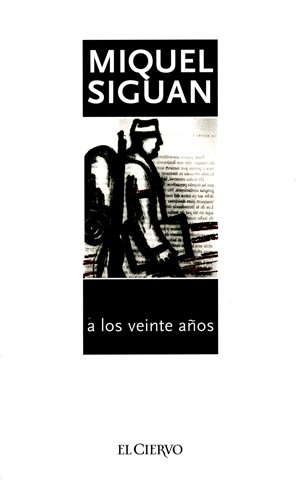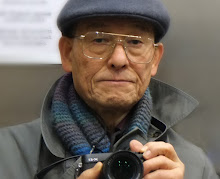(Please see the summary in English at the end of this article)
 (Dr.Miquel Siguan Feb,2008)
(Dr.Miquel Siguan Feb,2008)5月10日の朝、『二十歳の戦争』(スペイン内戦回想録)の著者ミケル・シグアン氏が92歳で亡くなった、との報せを電話で受けました。ちょうどそのひと月まえにバルセローナで同氏にお目にかかり、90歳を過ぎても老眼鏡なしで新聞を読み、パソコンに向かって著作活動を続けているシグアン氏の姿を目にしていただけに、一瞬絶句してしまいました。
5月10日付けのバルセロナのLa Vanguardia紙に、「さようなら、シグアン(Adiós, Siguan, adéu)」と題する追悼記事が載りました。その趣旨は、「ミケル・シグアン氏は、フランコ独裁の終焉にともないカタルーニャが自治を回復していらい、今日に至るまでのカタルーニャ文化の現実、すなわちカタルーニャ語とスペイン語の並存という、複数言語共存モデルの生みの親である。同氏は言語心理学者としての実証研究に基づき、分離主義者の主張に抗して多言語の共存モデルを支持すると共に、学校教育におけるカタルーニャ語とスペイン語の統合を説いた。シグアン氏は科学的結論にはこだわるが、道徳の原則以外にはいかなる主義にもとらわれず、わが道を行くタイプの人であった」と、その業績と自由闊達な言動に触れ、異文化の共存を軸とするカタルーニャ社会のあるべき姿を示唆した学識と良識の人、ミケル・シグアンの死を悼む内容になっています。
国内に複数の言語圏を抱える国の難しさは、カナダに住みケベックでの分離独立の動きを目にしてきた私には想像がつきます。カタルーニャの人たちがその固有の言語や歴史にこだわり、徹底して自治を追求しようとする姿勢には、まるでそれが遺伝子に刷り込まれているかのような感じがあります。そして、なぜそうなのかは、すこしカタルーニャの歴史を辿ってみれば私にも分ります。しかしそのこだわりの姿勢が、一歩まちがえば偏狭なカタルーニャ優先主義、別の言い方をすれば排外主義に陥ってしまう危険をはらんでいるように思えてなりません。
カタルーニャの外からは「このままでは、やがてカタルーニャでスペイン語が通じなくなる日が来るのではないか」という、いささか現実ばなれした批判が寄せられる一方、「いまカタルーニャ語の使用を強制しなければ、カタルーニャ語は滅びてしまう」という声をバルセローナでよく耳にします。フランコ独裁体制の数十年間、カタルーニャ語使用に制約を受けた記憶を持つ世代には、そんなせっぱ詰った発言が目立ちます。
しかし、2006年制定のカタルーニャ新自治憲章に定める「カタルーニャの公用語はカタルーニャ語とスペイン語である」という二つの公用語の原則は、州民投票でも支持されたものであり、言葉の問題を含め、カタルーニャ生まれでないスペイン人や、外国人に向けても開かれた社会を目指すのが、カタルーニャの永遠の課題ではないでしょうか。そしてそれこそシグアン氏が常に説いておられたことではないか、と思います。
多分に感情的なカタルーニャ語滅亡論に対して、シグアン氏は「不滅の言語というものはない。ただそれが何十年単位の話なのか、それとも何世紀単位の話なのか、その違いだけだ」とつぶやくように語られたことがあります。この世のものは全ていつかは滅ぶ、という歴史の大きなうねりを見通したうえでのつぶやきだったと思います。
シグアン氏が亡くなられたと聞き、あのときお尋ねしておけばよかった、と思うことがいろいろ心に浮かぶこの頃です。
(Summary of the article)
Dr. Miquel Siguan, ex-dean of the Department of Psychology of the University of Barcelna, died at the age of 92 in Barcelona. He was one of the pioneers of the modern psychology studies in Spain and the author of 27 books. One of them is ''La guerra a los 20 años''(The war at 20 years), a memoir of a young soldier who was drafted in late 1937 by the Republican army during the Spanish Civil War(1936-1939) when he was a philosophy student at the University of Barcelona. The book was published first in Catalan in 2002 and later in Spanish. Thanks to the help of Yoshihiko Uchida, my friend and co-translator, the Japanese version of this memoir was published in September, 2009 in Japan through the Chusekisha, a publisher in Tokyo..
In the morning of May 10(Sun) we got a phone call from Barcelona informing us about the death of Dr. Siguan. Joaquina and I were shocked with the news, because we had met Dr.Siguan in Barcelona in April when he was soon turning to 92. In spite of his advanced age he could read a newspaper without glasses and was still active in writing contributing often articles to La Vanguardia, Barcelona newspaper, as well as for his own blog. (siguan.blogspot.com).
La Vanguardia published an eulogy dated May 10th praising Dr. Siguan as one of the fathers who established co-existence models of Catalan and Spanish language in Catalonia during 70’s and 80’s when Spain was facing transition from Franco’s dictatorship to a democratic state. Dr. Siguan as a psycholinguist studied and brought to Catalonia the Quebec's experience in multilingual education. La Vanguardia also praises that he was always committed to the science and basic moral principles but was free from any dogmatic thinking.
Having lived myself in Canada for some time and have seen the separatist movement in Quebec, I can tell the difficulty of a country with more than one official languages where the word ‘’autonomy’’ or the language easily becomes an emotional issue.
During our annual visit to Barcelona in winter we often hear ‘’Catalan language would die, if it were not forced to use’’ while outside of Catalonia some people say ‘’Soon the Spanish will not be spoken in Catalonia’’, naturally an exaggeration.
With a quick review of the history of Catalonia we can understand why Catalan people give such an importance to the notion of uniqueness of Catalonia and its heritage. But I’m a little bit concerned that giving too much weight on ‘’uniqueness of Catalonia as a nation and use of Catalan language’’ might ending up creating a society comfortable for original Catalan speakers but not for anybody else in spite of the 2006 Statute of Catalan Autonomy which defines clearly the Catalan and Spanish are both official languages of Catalonia.
I believe the future of Catalonia will lie in the effort of all people toward promoting co-existence of languages in Catalonia and creating a society open also to non Catalan speakers which, I believe, was advocated by Dr.Siguan.
To the emotional comments such as ‘’Catalan language would die’’ I would respond next time that all are mortal in this world including languages as a matter of centuries. This concept I learned from Dr. Siguan during our latest conversation.
At the news of his death many questions occur to my mind which should have been asked him in April.



0 件のコメント:
コメントを投稿